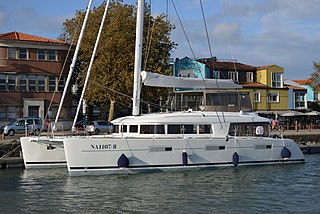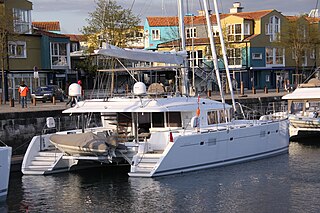Related Research Articles

Lagoon catamaran is a brand of twin-hulled boats that are designed and produced in Bordeaux, France.
The Lagoon 37 is a French catamaran sailboat that was designed by Van Peteghem/Lauriot-Prevost as a cruiser and first built in 1991.
The Lagoon 470 is a French catamaran sailboat that was designed by Van Peteghem/Lauriot-Prevost as a cruiser and yacht charter boat and first built in 1998.
The Lagoon 380 is a French sailboat that was designed by Van Peteghem/Lauriot-Prevost as a cruiser and also for the yacht charter role. It was first built in 1999.
The Lagoon 39 is a French sailboat that was designed by Van Peteghem/Lauriot-Prevost, with the interior by Nauta Design. It was designed as a cruiser and first built in 2013.
The Lagoon 400 is a French sailboat that was designed by Van Peteghem/Lauriot-Prevost as a cruiser and first built in 2009.
The Lagoon 42 is a French sailboat that was designed by Van Peteghem/Lauriot-Prevost as a cruiser and first built in 1990. It was also sold as the Moorings Lagoon 4200 for Moorings Yacht Charter use in the yacht charter trade.
The Lagoon 42-2, also called the Lagoon 42-2016, is a French sailboat that was designed by Van Peteghem/Lauriot-Prevost with styling by Nauta Design. It was designed as a cruiser for private owners and the yacht charter market, and was first built in 2016.
The Lagoon 47 is a French sailboat that was designed by Van Peteghem/Lauriot-Prevost as a cruiser and first built in 1992.
The Lagoon 570 is a French sailboat that was designed by Van Peteghem/Lauriot-Prevost as a cruiser and first built in 2000.
The Lagoon 440 is a French sailboat that was designed by Van Peteghem/Lauriot-Prevost as a cruiser and yacht charter boat. It was first built in 2004.
The Lagoon 500 is a French sailboat that was designed by Van Peteghem/Lauriot-Prevost as a cruiser and yacht charter boat and first built in 2005.
The Lagoon 420 is a French sailboat that was designed by Van Peteghem/Lauriot-Prevost as a cruiser and yacht charter boat, first built in 2006, as a 2007 model year introduction.

The Lagoon 620 is a French sailboat that was designed by Van Peteghem/Lauriot-Prevost, with exterior design by Patrick le Quément and interior design by Nauta Design. It was designed as a cruiser and first built in 2009.
The Lagoon 52 is a French sailboat that was designed by Van Peteghem/Lauriot-Prevost, with the exterior design by Patrick le Quément and interior by the Italian firm Nauta Design. It was intended as a cruiser and for the yacht charter role and first built in 2011.

The Lagoon 450 is a French sailboat that was designed by Van Peteghem/Lauriot-Prevost, with exterior design by Patrick le Quément and interior design by Nauta Design. It was intended as a cruiser, as well as for the yacht charter market, and was first built in 2014.

The Lagoon 560 is a French sailboat that was designed by Van Peteghem/Lauriot-Prevost, with the exterior design by Patrick le Quément and interior design by Nauta Design. It was intended as an offshore cruiser and also for the yacht charter role and first built in 2010.
The Lagoon 40 is a French sailboat that was designed by Van Peteghem/Lauriot-Prevost with the exterior design by Patrick le Quément and interior design by Nauta Design. It was intended as a cruiser and for the yacht charter role and first built in 2017.

The Lagoon 77, also marketed as the Lagoon Seventy 7, is a French sailboat that was designed by Van Peteghem/Lauriot-Prevost with the exterior design by Patrick le Quément and interior design by Nauta Design. It was intended as a cruiser and for the yacht charter role and first built in 2017.
The Lagoon 46 is a French sailboat that was designed by Van Peteghem/Lauriot-Prevost with the exterior design by Patrick le Quément and interior design by Nauta Design. It was intended as a cruiser, as well as for employment in the yacht charter industry and first built in 2019.
References
- 1 2 3 4 5 6 7 McArthur, Bruce (2022). "Lagoon 410 sailboat". sailboatdata.com. Archived from the original on 19 January 2023. Retrieved 19 January 2023.
- 1 2 3 4 5 6 7 8 Sea Time Tech, LLC (2022). "Lagoon 410". sailboat.guide. Archived from the original on 19 January 2023. Retrieved 19 January 2023.
- 1 2 3 4 5 6 7 "Lagoon 410 Sailboat specifications". Boat-Specs.com. 2022. Archived from the original on 19 January 2023. Retrieved 19 January 2023.
- ↑ McArthur, Bruce (2022). "Van Peteghem/Lauriot-Prevost". sailboatdata.com. Archived from the original on 18 December 2022. Retrieved 18 December 2022.
- ↑ Sea Time Tech, LLC (2022). "Van Peteghem/Lauriot-Prevost". sailboat.guide. Archived from the original on 18 December 2022. Retrieved 18 December 2022.
- ↑ "VPLP Design Sailboat designer". Boat-Specs.com. 2022. Archived from the original on 19 January 2023. Retrieved 19 January 2023.
- ↑ McArthur, Bruce (2022). "Jeanneau (FRA)". sailboatdata.com. Archived from the original on 4 January 2023. Retrieved 19 January 2023.
- ↑ Sea Time Tech, LLC (2022). "Jeanneau". sailboat.guide. Archived from the original on 18 April 2022. Retrieved 19 January 2023.
- ↑ "Jeanneau Sailboat builder". Boat-Specs.com. 2022. Archived from the original on 7 June 2021. Retrieved 19 January 2023.
- ↑ McArthur, Bruce (2022). "CNB (FRA)". sailboatdata.com. Archived from the original on 18 December 2022. Retrieved 18 December 2022.
- ↑ Sea Time Tech, LLC (2022). "CNB". sailboat.guide. Archived from the original on 18 December 2022. Retrieved 18 December 2022.
- ↑ McArthur, Bruce (2022). "Lagoon Catamaran". sailboatdata.com. Archived from the original on 18 December 2022. Retrieved 18 December 2022.
- ↑ Sea Time Tech, LLC (2022). "Lagoon Catamaran". sailboat.guide. Archived from the original on 18 December 2022. Retrieved 18 December 2022.
- ↑ "Lagoon Sailboat builder". Boat-Specs.com. 2022. Archived from the original on 19 January 2023. Retrieved 19 January 2023.
- 1 2 "Lagoon 410". katamarans.com. Archived from the original on 19 January 2023. Retrieved 19 January 2023.
- ↑ "Lagoon 410 Catamaran". catamaranreviews.com. Archived from the original on 19 January 2023. Retrieved 19 January 2023.
- ↑ Wender, Daniella (2018). "Lagoon 410 Catamaran Review – A Superior Cat!". cruisingsea.com. Archived from the original on 19 January 2023. Retrieved 19 January 2023.